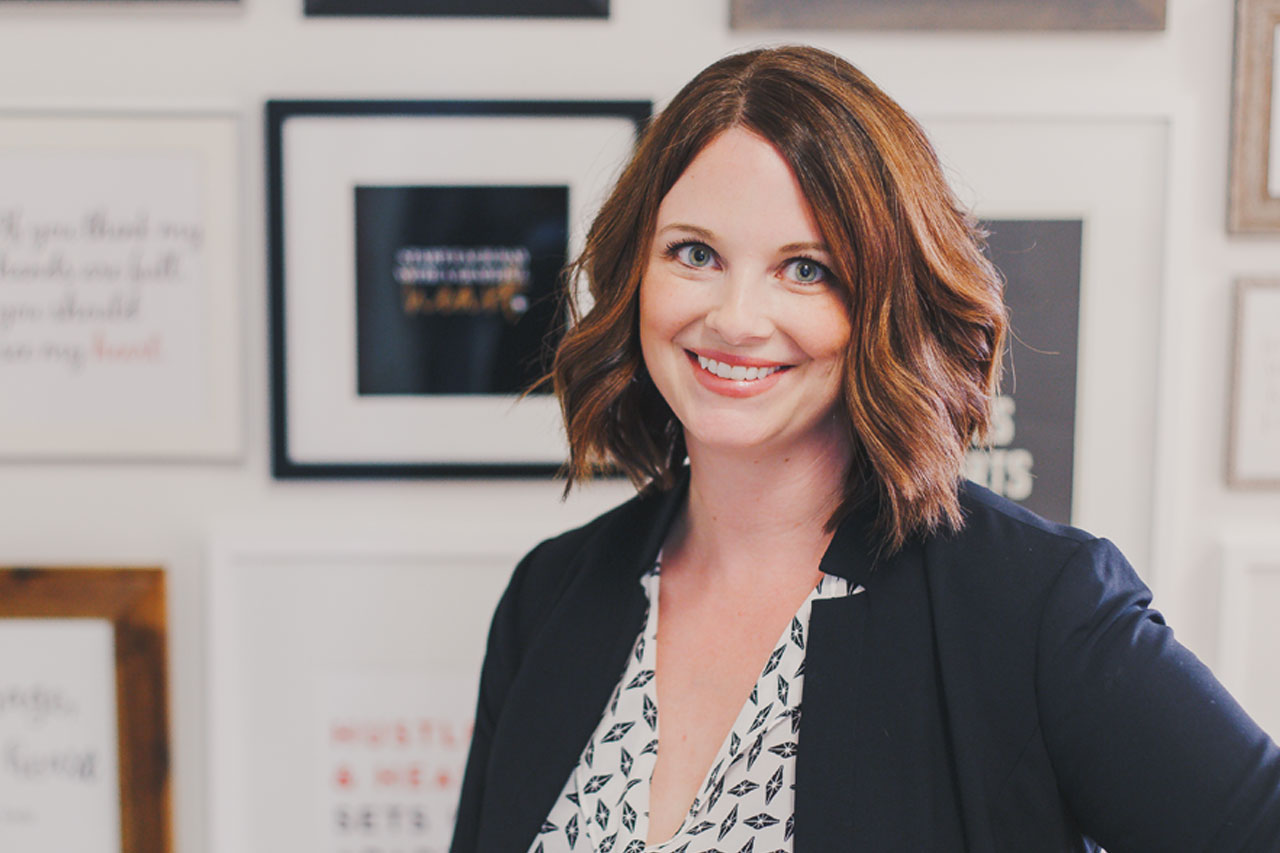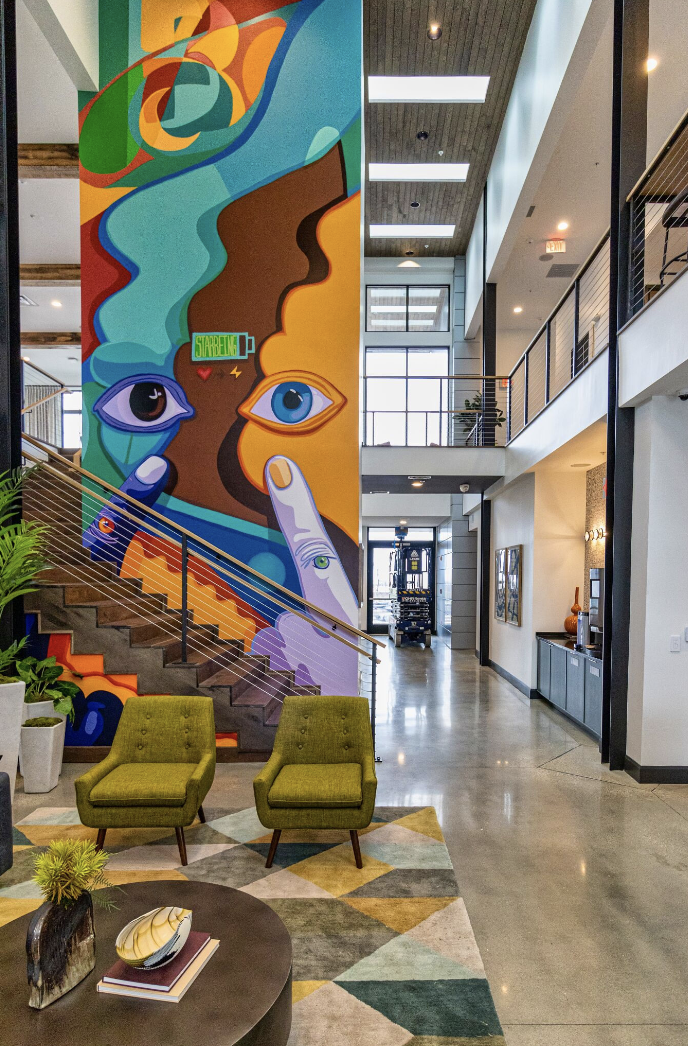Crimson Design Group is a business that was founded by a woman, is owned by a woman, and is primarily run by women. We have six working mothers on staff and we pride ourselves on being a business that supports and champions women. But we’re not alone in this! There are 75 million women in the work force and over 65% of mothers of young children are included in that number (Bureau of Labor Statistics). Daily, women strive to find balance between parenthood, relationships, fast paced careers, and more. Women truly are amazing. In this, our 16th year of business, we wanted to take some time to acknowledge the incredible, hardworking women in our community. We’re kicking off our new interview series, “Women Who Dare” by speaking with one of our favorite boss babes, Becca Apfelstadt, the CEO and co-founder of Columbus based company, treetree. In this interview, we learn how Becca started treetree, why she loves having working mothers on her team, and what advice she has for other female entrepreneurs!

The interview below was conducted on February 27th, 2019. Some answers have been abridged or edited for clarity/conciseness.
CDG: Can you give us a brief history of your company and description of what your team does?
Becca: Absolutely! We were founded in 2009, so we’re in our 10th year. We started in the recession which, I think, was a smart time to go into business for ourselves. We had to be scrappy and resourceful but were able to build a foundation for our company while most businesses were rebuilding. A lot of companies were trying to figure out what they needed to change but we got to start from the ground up.
We’re the Agency of Special Projects. In other words, we’re a supplemental resource for our clients. We often work with large companies that have in-house marketing teams or an agency of record already, but need extra help because of restrictions on their time, budget, or other resources. Typically, they call us in for urgent and important projects. We’re almost like the special forces of marketing. We have a wide variety of things we help our clients on but we’re 100% project based, which means they don’t have contractual obligations to continue using us. So, we have to hit every project out of the park and maintain our working relationships in order to continue to earn our clients’ trust and future projects. That’s a motivating arrangement for our team.
CDG: So what motivated you to start treetree?
Becca: Well… I wish I could say that we had had enough time before we started the business to develop a thoughtful business plan or to even plan at all….
I’d worked at another agency for ten years (starting as an intern and worked my way up to Vice President) before we started the business. Leading the brand strategy team allowed me to learn the inside operations of the business very well. I had a fantastic counterpart and friend who was the Creative Director there and she was the co-founder of treetree. In 2009, after an incredible decade of growth in business and employment, Columbus dealt with the most challenging economic conditions since the Great Depression. A lot of small businesses were not able to weather the storm and it became clear that we needed to figure out the next step in our career paths. Our options were to try to find employment with one of our competitors at the time, (where we knew the company culture just wouldn’t be comparable) or try to build something on our own. And, we’d really been spoiled in our last company, so we didn’t want to have to experience a new (potentially inferior) environment; we wanted to create something new and fresh, building off of all of the wonderful things we loved about our previous employer. Plus, at the time, everyone in communications seemed to be out of work. We would have literally been competing for any job with all of those people.
So we decided to do it on our own for six months, see if we could do it, and just give it a whirl. And we believed that we had the beginnings of something pure and the spark of something special. We knew how to do good work and we liked working together. So that’s how we started. We didn’t have a business plan, we didn’t have business cards right away, we didn’t even have a website for the first six months. But little introductions lead to small projects which lead to more relationships which lead to bigger projects and within the first nine months we got our first office and haven’t looked back since.
CDG: Where did the name come from?

Becca:
That’s a fun story! I have a long history of horticulture and agriculture in my family. My grandfather was actually the Chief of Forestry for the State of Ohio for many many years. Everyone in my family has a green thumb… everyone except me, it seemed. In my early 20s I just couldn’t keep anything alive. So, I was given a bonsai tree as a gift and I tried really hard to keep it alive. I named it “treetree” because it’s cute and like, a mini tree. It seemed to fit and I thought if it had a name, maybe I wouldn’t accidentally kill it. I completely failed… it died.
So, the day we decided we were going out on our own, I came home and I thought to myself, “Oh I really need to throw that thing away” but then I looked at it and did a double take. There were new buds on it! And that was a moment of inspiration. I just knew that if that little tree could make it, so could we. I suggested we name our company treetree, thinking that my co-founder, Tiffany, would think I was crazy. But she actually loved it too. So that’s how it came about. “treetree ” is such a friendly sounding name; it’s approachable. And so are we, so it really does fit us.
CDG: Over the last 10 years in business, what is the best and/or worst decision you’ve ever made as a business owner?
Becca: I think the smartest decision we made in the history of our company was to take a stance on our positioning. Sometimes it’s tough to take an approach that means you’re going to say “no” to something. But that’s what strategy is: deciding what you’re going to say “no” to so you can say “yes” to the right thing. It was a scary thing to do! No one was talking about being project-based at the time and here we were with “We’re the Agency of Special Projects” plastered all over our website. We had no idea how our competitors or the market was going to respond. Just the boldness of that and the clarity of that really helped clients to know when they should think of us for a project and conversations were more productive. But even more than that, having that clarity helped us know who we should work with, who we should hire, and how we wanted the business to grow. Claiming that positioning has really served us well. We’ve since gone on trademark that phrase (“We’re the Agency of Special Projects”) and it’s what we’re known for.

In terms of regrettable decisions? Rather than name one specifically…I will say, I think that whenever I’ve felt a twinge of, “Oh, that’s not how I thought that would go” or “Oh man, I shouldn’t have said that” it’s been because I didn’t trust my gut. That’s been the root of any moments I regret. I’ve had to really learn how to trust my gut because any time I talked myself out of a making a decision because I convinced myself someone else’s opinion was the right one, inevitably my original choice was the right one. But in the end, we’re all learning and it takes time to figure out that your first instinct is usually the right one.
CDG: What sacrifices have you had to make because of your work? How do you think that’s influenced you as a boss?
Becca: Well, of course there have been sacrifices along the way. Certainly there’s risk financially in running your own business. Of course, there’s the potential for a lot of reward, too, but there’s a lot on the line. I’d say that the biggest sacrifice along the way has probably been to my health. I’ve gotten a handle on it now but in the first several years, I definitely burned the candle at both ends and I didn’t pay attention to the cues of my body. And of course, during the process of building this business, I became a mother. With that, there’s also come a bit of sacrifice. There have been times that I’ve felt I’m in the wrong place wherever I am, either at work or at home. I’d be at work thinking I was neglecting my family or I’d be at home thinking about how I should be fixing something at the office. But I’ve worked really hard with my husband, Chris, and he and I have a fantastic team at treetree, to make sure that all parts of my life feel supported. And that’s really changed the way that I am as a leader of my business. Being a working parent myself has brought more understanding and empathy to the workplace.

CDG: Can you expand on that?
Becca: Absolutely. For example, when my son was born, he came about six weeks early, right as the business was exploding. The business grew 220% that year, we were about to move the office, he was premature… it was crazy. We did what we had to do, but I have regrets about that time. I felt I didn’t do my work well, I didn’t let my body heal, and I wish I’d had more to give our son. I wish I had had the courage to say what I needed a little more and to check in with myself and to be kinder to myself. There are so many things I learned from that experience that made me reconsider how I wanted to approach my maternity leaves in the future. So, with our daughter, I was able to take a little more time and we had more structure in the business too, which was helpful. But, I decided to take our regular maternity leave policy, the one we offered our employees. I took 60% of my pay and I only took eight weeks off. And it was terrible. I hated it. It was stressful and hard and I felt that it wasn’t good enough for my people. It’s not what I’d want a family member to experience. And I felt that this maternity leave wasn’t worth my employees staying for. So, I changed the policy. That’s a great benefit of being a business owner: I didn’t like the policy, so I changed it.
It’s now a Parental Leave policy, for both fathers and mothers. They can take 12 weeks off with 100% pay, whether it’s for their biological child or if they’ve adopted. I wanted my team to know that their job is secure and that we value them. We want them to know that we want them to be where they need to be, when they need to be there so that when they come back, they’re really back. I just felt that was the right thing to do.
CDG: With such a great parental leave policy, I’m sure you probably have a lot of parents on staff. There’s a myth that’s still, unfortunately, prevalent that mothers make bad employees because they’re distracted/not committed to the job, etc. Can you talk about your experience with your employees who are mothers?

Becca: I actually think that working moms are really among the most productive and hard working. I’d go so far to say that they’re bad ass. If you have a really tough project… sometimes they’re the most effective and efficient people to put on those projects because they know how to multi task and juggle a lot. I think there’s a special skill that comes with being a parent… the skill of prioritizing and problem solving under lots of stress. They have to know how to juggle and improvise.
CDG: What woman inspires you and why?
Becca: I just love Brené Brownand I love her work. She’s an academic that’s become a public figure. Her work in Dare to Lead and Daring Greatly, her parenting manifesto, and her story-telling are spectacular. The way she brought the concept of bringing vulnerability into the boardroom was so refreshing. I think it’s such an important idea, for executives of both genders to hear. I always look forward to when she has a new book coming out.
CDG: What advice would you give to the next generation of female business leaders?
Becca: I would tell them to take the time to really know yourselves. Find a way to ask yourself, “What do I need to feel ok/be better/love more/contribute more?” Is it a different arrangement at work? Help with certain tasks? Delegating more? Moving to another city? More time for self-care? Once you figure out what you need, remove the fear of asking for what you need. Don’t sacrifice yourself and get lost in others’ expectations of how you should be and what you should need. Remember that it’s a life-long thing to refine and figure out.

CDG: Now for a fun one: what are 3 things you can’t live without?
Becca: Well, of course, there are the givens: my family, my kids, my husband. But three other things…
1. Sleep- I’m a sleep connoisseur. I have every product available to get a good night’s sleep. It’s so important for my health and my mood and everything. So I try really hard to get a good night’s sleep.
2. My planner- I cannot live without it and a good day starts with a good plan.
3. Books- I also can’t live without books. I am an avid reader. I’m in the middle of Atomic Habits, by a local writer (thanks to Artie Isaac for my copy). It’s about how to maximize time and gives you tips and tricks on how to change your habits and avoid burnout.
Photos used courtesy of Becca Apfelstadt






